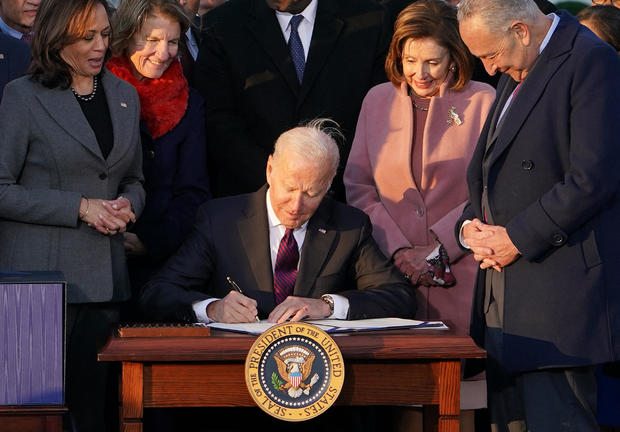Washington — President Biden signed his $1.2 trillion infrastructure bill into law on Monday, delivering on a major campaign promise that aims to revitalize the nation’s roads, bridges, waterways and public transit.
“The world has changed, and we have to be ready. My fellow Americans, today I want you to know, we hear you and we see you,” the president said on the White House South Lawn before signing the legislation. “The bill I’m about to sign into law is proof that despite the cynics, Democrats and Republicans can come together and deliver results. We can do this. We can deliver real results for real people.”
The president signed the bill as a bipartisan group of lawmakers, governors, mayors, and business and union leaders looked on. The bill earned the support of 19 Republicans in the Senate and 13 GOP members of the House.
Formally known as the Infrastructure Investment and Jobs Act, the law includes $550 billion in new spending on the nation’s physical infrastructure and represents the largest investment in roads, bridges, ports, water and rail in years. The measure provides $110 billion for roads, bridges and major projects, $39 billion for public transit and $66 billion for railways. It also provides $65 billion to expand broadband infrastructure and $55 billion for clear water investments.
“Today, we’re finally getting this done. So my message to the American people is this: America is moving again, and your life is going to change for the better,” Mr. Biden said.
Earlier in the day, the president signed an executive order establishing a task force to lead the coordination and implementation of the law. The task force is led by Mitch Landrieu, the former mayor of New Orleans.
Meanwhile, the Congressional Budget Office (CBO) said it would release a final estimate on the cost of Mr. Biden’s second signature piece of legislation, the Build Back Better Act, by Friday. While Democratic leaders and progressives had hoped to vote on the social spending package and the infrastructure bill together, the plan fell apart when moderates said they wanted to wait for the CBO score before voting. The CBO score is necessary before any Senate vote on Build Back Better due to budget reconciliation rules.
Democrats will only need a simple majority to pass Build Back Better in the Senate, but since no Republicans are expected to support it, all 50 Democrats will need to vote for it.

